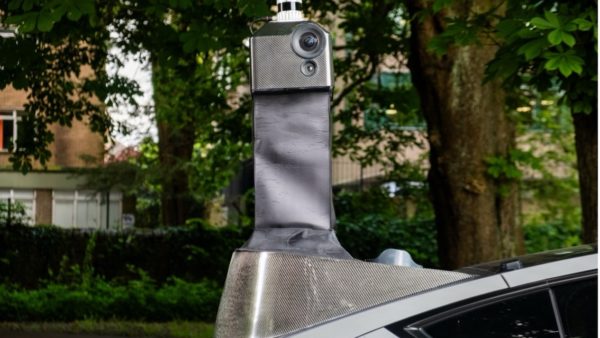A pair of Teslas fitted with scanners have been used to capture building data at scale in a trial funded by Innovate UK, the Welsh government and the UK Space Agency.
The Innovate UK Net Zero Heat Programme trial used Teslas fitted with data capture specialist XRI’s Building Environment Scanning System (BESS). The cars scanned 1.5 million properties in three months earlier this year.
The XRI technology gathers images, thermal characteristics and dimensions from the roadside, on the go. This means data capture can happen year round with the infrared identifying heat defects, and LiDAR creating a point cloud, giving distances and dimensions. Computer vision and AI is used to isolate and identify components of the buildings.
Data collection is fully automated with mapping and simultaneous localisation. This allows each BESS in the fleet to know where the others are in real-time for efficient scanning across locations.
The data captured can be used to define:
classifications of materials, including wall material and cladding finishes, window and door framing and glazing types, and chimney, guttering and ancillary feature materials;
building features, including building type, configuration and attachment, porches, overhangs, bay windows, extensions, modifications and shading; and
thermal characteristics, including relative thermal performance across building components and key points of leakage.
Cost-effective assessment
Innovate UK noted: “All of this [was] achieved without any need to enter the property – no more awkward door knocking! [That said] the BESS is not designed to replace in-person visits, which are vital for understanding internal home layouts and for resident engagement. However, in-person surveys are expensive and can be tricky to carry out. The BESS can deliver cost-effective assessments of building quality and condition and, when combined with other data, can suggest suitability for a range of energy efficiency measures prior to a home visit, making the subsequent visits by renovation experts more valuable.”
Data gathered by BESS during the Innovate UK project is being made available to a small number of other projects within the Net Zero Heat programme over the coming months. Later in 2024, further beta data sets will be released for interested organisations to use.
The technology has caught the attention of New Scientist, which created the video below.
Don’t miss out on BIM and digital construction news: sign up to receive the BIMplus newsletter.
The post The drive-by Tesla approach to building carbon data capture appeared first on BIM+.


